- Home
- Giles Foden
2004 - Mimi and Toutou Go Forth Page 15
2004 - Mimi and Toutou Go Forth Read online
Page 15
‘Sit down!’ shouted Tait above the roar of the engines.
‘No thank you, sir,’ replied the Donegal man in his deep brogue. ‘I can see better standing up.’
Spicer started shouting at Waterhouse, who was manning the gun. He was trying to spot for him, trying to give him the ranges—but Waterhouse couldn’t understand a word, because of the cigarette holder in Spicer’s mouth and the noise from the engines. He fired, knowing he had missed the moment the boom of the shell sounded in the breech; the muzzle wasn’t steady, pointing wildly up and down with the movement of the boat.
Up on the cliff, the doctor and Eastwood watched the shells falling around Toutou, which was also careering wildly. The Holo-holo were murmuring in astonishment. Then another shell boomed out and suddenly flames were licking the deck of the Kingani.
§
Down in the engine-room, the German Chief Engineer knew at once it was a fatal hit. Running up on deck he was confronted by a dreadful sight. Junge and his two petty officers had been blown to pieces: the high-explosive shell had come right through the iron gun-shield supposed to protect them. There was blood everywhere. Leutnant Junge’s leg had been ripped off at the hip and his body was leaning awkwardly against the remains of the gunshield. Penne and Schwarz were less mangled, but clearly dead. The ship’s mascot bleated pitifully in the ruins. As the Engineer took in the gruesome scene, his nostrils filled with the acrid smell of explosive. Another shell whistled over and went straight through the engine-room skylight. This time there was no explosion; he realised that the shell, coming down on its parabola, must have passed right through the side of the boat.
There was a splash and he saw Fundi slip into the water and swim away. The two motor-launches were bearing down on the Kingani now, still firing. Water was coming in through a shell-hole in the port bunker. Flames licked the wooden deck. There was nothing to do but surrender. He began to haul down the large Iron Cross flag from the mast. He must have thrown it into the water or the flames, because it was never captured.
Seeing that one of the British boats was still heading directly for him at great speed, the Engineer pulled out his handkerchief and waved it vigorously. He could see a man in the front of the boat with a cigarette holder in his mouth and—wearing a skirt?
The boat, its engines still at full throttle, rammed into the side of the Kingani. The Engineer watched in astonishment as the man in the skirt fell over, then got up again at once, laughing.
The other launch came alongside and an English officer climbed aboard and took the Engineer prisoner. The officer, who announced that his name was Flynn, blanched at the sight of all the blood and pieces of scorched flesh. He eyed the goat curiously, which was still bleating away. Another Engldnder ran up the white ensign where the Iron Cross had flown.
The vessel which had rammed them had already turned back to shore, her bows damaged from the collision. The Kingani followed, under the command of the squeamish Flynn, who avoided looking at Junge’s body and the blood-spattered deck. The Engineer saw the man in the skirt step on to the beach, surrounded by a crowd of Africans shouting and clapping. Guns from the Belgian shore battery fired in triumph and he felt sick to the pit of his stomach. As one of the Engldnders pointed a rifle at him, another brought the Kingani into shore.
Leutnant Junge’s corpse rocked with the motion of the water, his torn hip fused to the blackened gunshield. The Engineer steadied himself as the Kingani ran aground with a heavy list to starboard. Junge’s body made a sickening lurch from its pivot and seconds later the man called Flynn fainted.
§
Once it was known that a German vessel had been captured, more Holo-holo nocked from the inland villages to join those thronging the paths from the bluff. As Magee writes: ‘They came bounding down from the trees and the hilltops, giving vent to loud whoops of delight and gesticulating wildly, simply falling over each other in their hurry to reach the beach in order to pay their homage to the new Great White Chief, our commander. There they assembled in thousands, arrayed in their brightest pigments and gaudiest loincloths, a jigging, jogging, frenzied mass…’
Dr Hanschell also descended the cliff with Eastwood and Magee. Collecting his medical bag from his tent, in case there were wounded who needed treating, he went to the beach. The crippled Kingani was being pulled in as far as she would come and the doctor spied a goat standing with its hooves in the shallows, casting a quizzical eye on all the commotion. The German prisoners were marched away by Belgian askaris. Meanwhile, the Holo-holo men threw themselves on the ground in front of Spicer, trickling sand into their hair in what was clearly a sign of homage. The women crowded round him, tugging at his skirt and epaulettes. They simply wanted his gaze to fall upon them, says Magee, ‘regarding this as a fetish which would protect them from evil spirits’.
But in Shankland’s account, Spicer does not seem like a man enjoying the fruits of victory: ‘The Doctor went across and congratulated him: he stood there dazed and unsmiling, and only moved his lips silently as if trying to say thank you. Then he turned to examine the damage to Mimz’s bows…Perhaps, the Doctor thought, he couldn’t yet adjust himself to the fact that after years of romancing he really had distinguished himself at last.’
Leaving Spicer to the congratulations of the Belgian officers—expressed, says Magee, ‘in the usual demonstrative Continental fashion of embracing and kissing’—Dr Hanschell climbed aboard the Kingani. Walking across the deck, he noticed that his boots were covered in blood. It soon became obvious there was nothing he could do for Junge, Schwarz and Penne. He went to sit on the quay with Flynn, who was still recovering from his fainting fit. The petty officer was dangling his boots in the water to clean off the blood and the doctor followed suit. Neither of them spoke for a while. All that could be heard was the jubilant hubbub of the crowds overlaid with the salutations of some askari buglers and drummers, who were sounding a fanfare in Spicer’s honour. Some members of the band were hardly more than children.
SEVENTEEN
The same bugles sounded that evening at the funeral of the dead Germans. Their bodies had been wrapped head to toe in white canvas and, stretched out on wooden trestles near a mound of fresh red earth, they resembled ancient mummies.
Between Stinghlamber and Goor stood Spicer, his hat under one arm and his khaki skirt revealing bare knees above brown puttees. Behind them stood the Asian deckhands from the Kingani wearing their loincloths; Rupia in his fez; Marapandi, Eastwood’s servant; and Tom, who now affected a skirt like his master. Nearby was a shaken-looking trio of German prisoners.
On the other side of the graves stood Dr Hanschell and the British officers. The doctor did his best to listen to Spicer as he read the burial service, but his mind wandered back to the moment when he had been sitting on the quay with Flynn. Spicer had arrived to inspect the Kingani, stepping over the corpses of Junge and the others to count the marks where shells had struck.
‘Twelve hits out of thirteen shells,’ he announced. ‘That’s a pretty good show.’ He went on to attribute much of this success to his own range-finding, despite the fact that Waterhouse could not understand his instructions. And then, quite casually, Spicer bent over Junge’s twisted body and calmly removed the dead man’s signet ring.
It was on Spicer’s finger now as he read the burial service psalm: ‘I said I will take heed unto my ways: that I will offend not in my tongue. I will keep my mouth as it were with a bridle: while the ungodly is in my sight. I held my tongue, and spake nothing. I kept silence, yes, even from good words…’
The bugles sounded the last post as the sun flooded in low from the western side of the lake, turning the waves scarlet where the light touched the water. Dr Hanschell watched the deep-red orb dip below the surface. His eye was drawn to a group of Holo-holo behind Spicer. They now knelt down whenever he passed.
Spicer’s words echoed under the bluff, his skirt flapping in a light breeze, the red sun glinting on his new ring. ‘Man that is born of a
woman hath but a short time to live, and is full of misery. He cometh up, and is cut down like a flower; he fleeth as it were a shadow, and never continueth in one stay…’
A rifle salute, fired by 50 Belgian askaris, concluded the ceremony. Specially chosen guards were posted over the graves during the night. According to Magee: ‘The significance of this lies in the fact that a large majority of the Belgian native troops are recruited from tribes addicted to cannibalism and some of them might have felt tempted to take the opportunity of indulging in their horrible custom if precautions had not been taken to prevent it.’↓
≡ In his lecture, Spicer used this event to display some fancy vocabulary: ‘A guard had to be placed over the graves to prevent the askari, who still retain their anthropophagous habits, from digging them up.’
Spicer wasn’t alone in wanting a trophy. Soon after he had returned to his hut, Dr Hanschell was visited by the red-haired Irishman. He had a little bottle of Junge’s blood and wanted to preserve it as a souvenir. A petty officer accompanying the Irishman also had a bottle filled with blood. Holding it up to the light, the doctor saw to his horror that the second bottle contained half a finger that had been severed from one of the dead. He obliged them all the same, pouring antiseptic into the bottles to stop their contents putrefying.
Recounting all this to Shankland in the 1960s, the doctor could not remember the name of this petty officer, but the event clearly affected him deeply. It made him wonder in what, exactly, Western civilisation consisted: ‘When they had gone, he sat for a time deep in thought. Spicer had the Captain’s ring as a trophy, the askaris wanted to eat the bodies, and now these two men had bottles of blood. Requiescat in Pace. ’
A few days later, a tall, half-naked African teenager with long soft curls was brought to ‘Tubby’ Eastwood by his Nyasa servant. Marapandi explained that his name was Fundi and he was the stoker off the Kingani. The boys had been hiding him in their camp since he had swum ashore during the fight. Eastwood suggested he join Cross and Lamont in the engineering workshop. Spicer agreed: he had no intention of following procedure and handing Fundi over to the Belgians after they had kept him in the dark about Rosenthal.
This decision increased Spicer’s standing with his men, which had in any case risen considerably since the engagement. They liked the sweet-natured Fundi and he transferred his loyalties from the Germans to the British with remarkable ease. As Shankland reports:
Fundi soon became popular with everyone: he had something of the quiet dignity of a pastoral tribesman. The other boys and the ratings supplied him with clothes, and he was put on the ration strength. The Doctor’s contribution was a used razor blade with which Rupia cut a path through Fundi’s curls, giving him a nice central parting: the boys parted their hair ‘all the same masters’, using razor blades on each other to achieve the proper effect.
It was agreed that Fundi would remain the Kingani’s stoker once it had been refitted. The eleven surviving members of the Kingani’s crew—three German engineers and eight African deckhands—were marched away by Stinghlamber’s men. The goat that had been on board was adopted by Tait, who tried to dress her up in naval uniform and take her on parade. But the goat was not as tractable as Josephine, although she let the chimp ride on her back.
Over the next few days the Kingani was raised and mended. The shell-hole in her hull was repaired by Lieutenant Cross. After sending out for wood from the forest, he made an iron patch over a charcoal fire with bellows. He then applied the red-hot slice of metal to the tear in the hull.
Until then the former racing driver had shown litle aptitude for engineering, so everyone was fairly astonished when the patch worked. Lament, the Glaswegian engineer with whom Cross had a difficult relationship, was full of praise and even Spicer was gracious for once. He promptly renamed the ship HMS Fifi, which he thought went rather well with Mimi and Toutou. It meant ‘Tweet-tweet’ in French and was suggested by the wife of a Belgian officer (she had a little cage bird of the same name). Shankland reminds us that ‘HMS Fifi was the first German warship to be captured and transferred to the Royal Navy.’
With Fundi’s help, Lament fixed Fifi’s engines and the Belgians handed over a large gun with which to rearm her: it was one of the twelve-pounders that had formed part of their defences on the cliff. They were happy to do this because some new guns had been brought up from Kinshasa. Also their own steamer the Alexandre del Commune had at last been repaired and brought out from its muddy resting place on the banks of the Lukuga. There were similar plans afoot to finally assemble the Baron Dhanis, which still lay in pieces at Kabalo. A boiler had been found for her at last.
The Del Commune now came under Spicer’s command. The Belgians had optimistically renamed her the Vengeur. The six-pounder that had been on the Kingani when she was captured was mounted on the Vengeur. There was a delicious double irony in this, since that gun, like those of the Götzen, had once been on the Königsberg, Rosenthal’s old ship. Prior to that it had been on the City of Winchester, a British merchantman that the Kbnigsberg had captured at the start of the War. (The Germans could have celebrated with a nice cuppa afterwards, as the Winchester was filled with crates of the best Ceylon tea.)
Why Spicer took command of a Belgian vessel needs some explaining. Though they were hardly on friendly terms, the capture of the Kingani had brought about something of a rapprochement between the Allied forces on Lake Tanganyika. The Belgian and British governments had come to an understanding whereby Spicer would be in charge afloat and Stinghlamber in command ashore. The Admiralty was exceedingly pleased with Spicer’s performance. His promotion to full (rather than acting) commander was relayed by Morse code through a pair of Marconi field radios that had been recendy installed at Albertville. At about the same time, another message came through. Spicer read it out at a special parade: ‘His Majesty the King desires to express his appreciation of the wonderful work carried out by his most remote expedition.’
The Holo-holo offered more than mere ‘appreciation’. The sinking of the Kingani and the sending away of the German captives did not simply make him a man of power in their eyes, it elevated him to the category of divine being. Everything he did seemed to increase their reverence. ‘The tattooed snakes curling up his arms added to his lustre,’ explains Byron Farwell, ‘particularly when he took to semaphoring to or from the launches, even though no one, not even the signalman, could read his messages. The Ba-Holo-holo believed he was calling to his ju-ju to deliver another German ship into his hands. Perhaps he was doing something like that.’
Acutely aware of his image, Spicer was not averse to a little stage management.
‘You’ve got the devil’s own luck,’ Dr Hanschell told Spicer shortly after Cross had patched up the Kingani. ‘All along you’ve been wanting to capture one of the enemy’s vessels—and now you’ve done it!’
‘Only ignorant people talk about luck,’ replied Spicer. ‘This was a case of successful mystique.’
Successful mystique. It was a strange thing to say, because the capture of the Kingani and Cross’s repair-work were far from mystifying. Perhaps Spicer meant that he had inculcated a spirit of resourcefulness in his men by cultivating an air of mystery. This may have impressed some of them, but the majority regarded him as a figure of fun. Cross, in particular, went to great efforts not to burst out laughing whenever Spicer spoke.
But among the Holo-holo Spicer was a god. His deification had been well prepared for as news of his journey and the wondrous machines that accompanied him had spread throughout the bush. After the capture of the Kingani, his stock needed to be maintained: one of the ways he did this was through a ritual that became known as ‘the twice-weekly bath’.
Every Wednesday and Saturday, just before 4 PM, Tom emerged from his master’s hut with a grass mat, which he then proceeded to unroll on the ‘quarterdeck’. Without fail, a throng of Holo-holo gathered to watch. Many were dressed in ceremonial costumes with horn and feather adornments; some p
erhaps wore the slit-eyed wooden masks of the Holo-holo that are collector’s items today, now that the tribe is on the brink of extinction.
Tom would return to the hut and come out carrying a green canvas bathtub on his back, which he then filled with cans of steaming water. As the Holo-holo jostled for the best view, he would place a stool by the tub on which he would set a bottle of vermouth and a tooth-glass. Tom would then test the water in the tub with a forefinger before going to fetch his master.
Farwell takes up the story as Spicer appears—rather like Mr Kurtz in Conrad’s Heart of Darkness :
The god himself emerged from his hut wearing only slippers and a towel draped round his waist, every inch of his torso covered with tattooed beasts, birds, reptiles, flowers, and insects. He stood for a moment smoking a cigarette in a long holder while his audience clapped. When silence fell, he raised his arms and, flexing his muscles, set the tattooed snakes writhing. Then, handing his cigarette holder to his servant, he stepped into the bath. He scrubbed vigorously, using a heavily scented soap that perfumed the air. When completely lathered, he stood up while his servant rinsed him with buckets of cold water. He then dried himself, wrapped the towel around his waist, and lit another cigarette while his servant poured him a glass of vermouth, which he drank appreciatively.
Sometimes the bath rite was preceded by a series of physical jerks. Farwell doesn’t mention these in detail (and Magee doesn’t mention the bath business at all), but they get the full Shankland treatment: ‘The natives, with eyes open wide, began to sigh—‘Aaaaih…!’ and click their tongues in time with the exercise—‘Click—Aaaaih! Click—Aaaih!’ and kept it up all through the whole performance.’

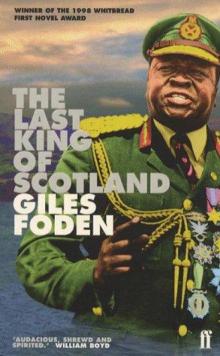 The Last King of Scotland (1998)
The Last King of Scotland (1998)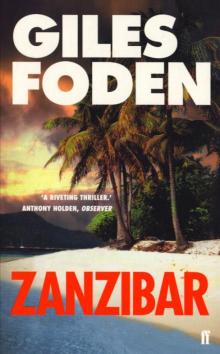 Zanzibar
Zanzibar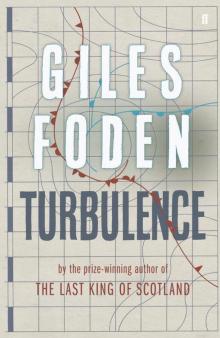 Turbulence
Turbulence The Last King of Scotland
The Last King of Scotland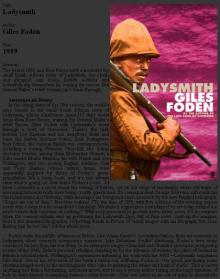 1999 - Ladysmith
1999 - Ladysmith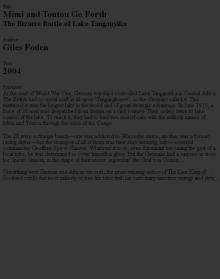 2004 - Mimi and Toutou Go Forth
2004 - Mimi and Toutou Go Forth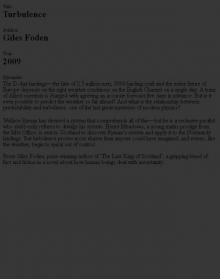 2009 - Turbulence
2009 - Turbulence